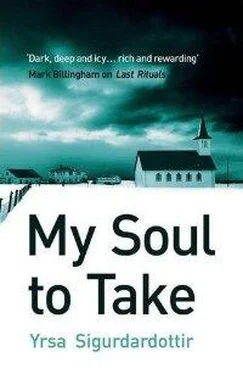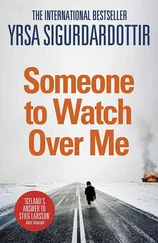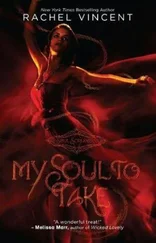After Gylfi had agreed, she ended the call. Thóra could only hope that he would do as he was told. As a rule he was obedient, but if they had parked at the roadside or somewhere equally random, they would surely get hungry and need to move soon. She put her mobile in her pocket and turned to Matthew. “I said it last night and I’ll say it again. Never have children.”
Thóra drummed against the edge of the desk with the pen she was holding between finger and thumb.
“Does that help you to think?” asked Matthew. “I hope so, because I can’t keep a thought in my head with that racket.”
She put down the pen and turned glumly to Matthew. “This is important. I’m trying to keep my mind on this, but I can’t stop thinking about my children in that trailer.” She closed her eyes and inhaled deeply. “Why on earth did I buy that contraption?”
“Because you’re rubbish with money?” He smiled.
They were sitting in the hotel room, Thóra at the desk and Matthew on the bed. He was reclining comfortably against the headboard. She was sitting on a modern-looking chair that valued appearance over practicality or comfort.
“Start by writing down what you know for certain,” he said, making himself even more comfortable. “The rest will follow.”
Thóra picked up her pen and thought for a while. At her suggestion, she and Matthew were going through the details of the case in preparation for meeting Börkur and Elín, the brother and sister who had sold Jónas the land. She had a feeling this would be her only chance to ask them detailed questions, so she wanted to have everything straight. “Okay,” she said, and started writing.
When she looked up, she had filled three pages of A4 paper. Admittedly they were widely spaced, so there was not that much text—she wanted to keep the details she remembered clear. She looked over to the bed, feeling pleased with herself. “Wake up,” she said, seeing that Matthew had dozed off.
Matthew woke with a grunt. “I wasn’t asleep,” he responded. “Have you finished?”
“Yes,” Thóra said, picking up the sheets of paper. “At least, this is all I can remember right now.”
“Tell me,” Matthew said, propping himself back up. His body had slid down from the head of the bed when he fell asleep.
“Firstly, there’s the ghost. I’ve talked to quite a few people and they all agree this place is haunted. Although most of the locals are fairly gullible, I’m inclined to believe something happened here—”
Matthew interrupted her. “Are you kidding?” he asked. “You think there’s some truth in the ghost story?”
“No, of course not,” Thóra said tetchily. “You didn’t let me finish. I was going to say that presumably there’s a natural explanation. Most people here believe in the supernatural and might interpret strange goings-on in those terms—incidents for which there might be other, more normal explanations. I think we ought to try to find out what they are. Ghosts on the lawn, the sound of children crying in the middle of the night, apparitions in the bedrooms.”
“The ghost only appeared in Jónas’s room,” Matthew said, pedantic as ever. “But that might not matter. How can you explain all that? Maybe it’s aliens?”
“Ha, ha,” said Thóra humorlessly. “The thought struck me that it might just have been Birna and Bergur having sex outside. The counselor said they went in for rough sex. Who knows, the wailing sound might have come from them and the ‘ghosts’ could have been them, looking for somewhere to go?”
“I heard the crying, and it had nothing to do with sex,” said Matthew, blushing slightly because he knew Thóra thought he’d imagined it. “Besides, Birna was dead by the time I heard it.”
Thóra regarded him thoughtfully. “I don’t know how to say this, but I don’t think you heard anything. I think you dreamed the whole thing.” Seeing that Matthew was about to protest, she quickly went on, “Anyway, I’m sure there’s an explanation and I’ve resolved to find it, because it could be linked to the murders.”
“Wouldn’t doing that ruin Jónas’s case about the concealed defects in the property?” he asked. “If you can explain the ghosts, you have nothing to base the compensation claim on.”
“No, of course, that would be a major setback—if the case had any legal merit to begin with,” she replied. “I do think Jónas is telling the truth about what prompted him to bring the action, though: these ‘ghosts’ have a negative effect on his employees and therefore on his business. If I can explain the hauntings and prove that they were not supernatural, I’ve achieved his ultimate goal. The employees will be happy, and Jónas can stop worrying about resignations and demands for pay raises.”
“That’s if they believe you,” said Matthew. “Even if people listen, they don’t necessarily hear.”
Thóra put down one sheet of paper and picked up another. “Whatever. Either way, I think there’s a logical explanation.” She skimmed the page and looked up. “Then there’s Birna’s murder. There are several things about it that need closer examination.”
“Such as your weird client?” Matthew smirked.
Thóra resisted a momentary urge to throw the ashtray at him. Instead she said, “Yes, actually. Among others. He may well be more involved in this than he admits. For example, he didn’t tell me the truth about his connection with Birna. It would be good to hear an unbiased account of their relationship and how it ended.”
“What do you think about the message sent to Birna from his mobile?” Matthew asked. “Do you believe it was sent without his knowledge?”
Thóra shrugged. “Damned if I know. Actually, I find it hard to believe Jónas killed Birna, whether he sent that message or not. He’s the type who wouldn’t admit to sending it, because of what happened afterward. He mightn’t have met her there, even if he sent the text. Maybe something came up, or he simply changed his mind.” After a pause she added, “If so, Jónas might have told the murderer where they were going to meet and he saw his chance.”
“Who, though?” asked Matthew.
“I don’t know, but Jónas might be able to tell us something.” Then she shook her head. “No, he won’t, actually. He can’t say anything without admitting that he sent the message. We’ll never get him to do that.”
“The other possibility, of course, is that the murderer stole his mobile and sent the message in Jónas’s name. He said he never has his phone on him,” Matthew reminded her. “There are plenty of people who’d have had the opportunity. Guests at the hotel, staff, and of course the audience at the séance. The problem with this theory is that no one at the hotel, or at least no one attending the séance, could have made it down to the beach to kill Birna—not if the murder was committed around nine, as the text message suggests.”
“Agreed,” said Thóra, looking back at her notes. “Then there’s this farmer, Bergur. I put him at the bottom of the page because he’s doubly involved through the man who was found dead at his stables. I think that’s a hell of a coincidence. Two bodies in three days, one his mistress, the other on his property. I’d really like to know the identity of that man.”
Matthew’s eyes narrowed. “Have you considered Bergur’s wife? She would seem to have ample reason for getting rid of Birna, if their marriage meant more to her than to her husband.”
Thóra nodded slowly. “You’re right, of course. Maybe we ought to pay her a call. What pretext should we use?”
“We could offer to muck out the stables,” suggested Matthew, laughing. “She’s bound to need that done.”
Thóra smiled. “Yes, that might work—if she’s blind and stupid. No one would believe you’re a shit-shoveler. You might as well offer her Icelandic lessons.” She inspected his neatly pressed trousers and crisp white shirt. “Perhaps you could say you’re a Mormon missionary. You wouldn’t even need to change your clothes.”
Читать дальше












